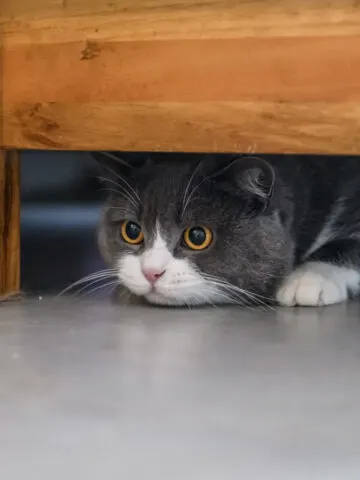We all love to belt out our favorite songs, especially in the comfort of our own homes.
Music can be relaxing, energizing, healing, and comforting, so we assume our animals will love it just as much as we do.
Cats tend to hate singing due to their advanced sense of hearing; a reasonable volume for you could overwhelm your cat.
It may not be the singing itself but the volume and tone of your singing that bothers your feline friend.
Cats also might not share your love of music, and studies have shown they prefer species-specific sounds or classical music.
So don’t feel too sad if your cat escapes to another room during your big solo musical number.
It has nothing to do with your singing voice (probably) and more to do with how your cat processes sound. We’ll explore some of the reasons below.
How Well Does A Cat Hear?
Your cat may love the type of music you sing, just not the volume or tone you sing it in. Cats have very sensitive hearing and can hear frequencies both lower and higher than a human or a dog.
This acute hearing assists with their predatory nature and allows them to detect a broader range of sounds.
Because of that, any loud or abrupt noises, including singing or music, can be distressing and sometimes harmful to your cat.
What may seem like a reasonable volume to you could be overwhelming or even damaging to their hearing.
A cat’s hearing frequency is between 48Hz-85KHz; this is one of the broadest hearing ranges found in mammals.
Cats are capable of hearing much higher pitches, 1.6 octaves higher than a human and 1 octave higher than a dog.
A cat’s ear can amplify sound waves 2 to 3 times for frequencies of 2000-6000Hz. Cats not only hear the higher frequencies but lower frequencies as well.
So when you’re hitting your best Mariah Carey-esque notes, your kitty may not appreciate it.
What Makes A Cat’s Hearing So Sensitive?
A cat’s ear consists of three parts: the outer ear (pinnae), the middle ear, and the inner ear. This structure isn’t much different from other mammals.
What makes a cat’s ear more sensitive is the unique ability to have mobile pinnae.
This means they can turn and move their ears independently, similar to a satellite dish. This ability allows for a more significant increase in sensitivity by up to 15-20%.
Additionally, cats have 30 sets of muscles in their ears compared to just 6 sets of muscles in a human ear.
It’s common knowledge that cats typically land on their feet, but do you know why? A cat’s balance is dependent upon their hearing.
Cat’s ears have three canals filled with fluid and lined with tiny hairs. The fluid moves over the hair and alerts your cat’s brain on the direction of their movement.
How Does Your Cat Hear Sound?
Your cat can hear higher and lower-frequency sounds. So, the smaller the sound wave (higher frequency), the more sensitive your cat will be to it.
These sounds can often be things you don’t even notice, such as the hum of electronic devices or appliances or perhaps the sound of a mouse rustling in leaves nearby, and even their human speaking in a whisper.
A cat can hear these high-frequency sounds from almost 3 feet away. So if you do sing to your cat, try giving them some space and do so in a lower volume.
If you do, you might find your cat does enjoy you serenading them.
Do All Sounds Bother Cats?
There are some sounds that bother cats more than others. Like humans, cats can be startled or scared by sudden, unexpected, and loud noises.
If you’ve ever watched your cat somersault into the air because you’ve dropped something on the floor, you know this is true.
While it may be funny at the moment, it’s scary for your cat. This is because they are constantly tuned in to the sounds around them and hear them at a much higher volume.
Your cat may also associate certain sounds with positive experiences. For example, most cats love the sound of crinkly things.
But, alternatively, they can also associate sounds with previous trauma; these associations determine their like or dislike for the sound.
What Sounds Do Cats Hate?
In general, there are certain sounds that all cats dislike. Hissing, high-frequency sounds, quick or abrupt sounds, and loud sounds. A cat can interpret a hissing sound as danger nearby.
This is because cats make hissing sounds when threatened or scared as part of their own defense response.
High-frequency, quick or abrupt sounds, and loud sounds can hurt a cat’s ears because of their sensitive hearing.
Do Cats Like Music?
Cats like music; they just might not share your taste for music or the volume at which you listen to it. For cats, it comes down to the frequency, pitch, and of course, the volume.
In fact, a study published in the Applied Animal Behavior Science Journal discovered that cats enjoy species-specific music.
This is music that features or mimics similar frequencies to the sounds a cat would hear in nature.
What Is A Species-Specific Sound?
In short, species-specific sounds will fall within the frequency range and similar tempos of natural communication for that species.
For your cat, that might mean the sound of a kitten purring or birds chirping.
Are There Types Of Music Cats Enjoy?
Your cat may surprise you with their taste in music. There are a few tips you can try when testing your cat’s preferred musical genre. Start with a low tone and try music with different pitches and frequencies.
Classical music and lullabies might be a great place to start. This is also a useful technique when singing to your cat.
Watch your cat’s reaction to the music you play. Are they purring and rubbing against you or running to hide under the bed?
Can Loud Music Harm Your Cat?
Yes, loud music can harm your cat. Have you ever put in your earbuds and not realized they were at full volume and startled yourself when your music came blasting on?
As previously noted, a cat’s hearing is more advanced than a human’s. Studies in cats have shown that both short and long-term exposure at certain decibels can cause hearing loss for your cat.
For reference, human conversation is typically between 60-70 decibels. Rock music starts at 115 decibels. And short-term exposure to 120 decibels can damage a cat’s hearing.
Does Your Cat Recognize Your Voice?
Research from the University of Tokyo shows that your cat does, in fact, recognize your voice. The cats observed in the study responded to human voices 50-70% of the time.
But they displayed a stronger response when they were called by their owner versus a stranger.
This doesn’t necessarily mean that you’ll be able to train your cat to come running when you call them. They recognize your voice that doesn’t mean they care.
The study showed that cats came when called only about 10% of the time. After all, they are still cats, and being aloof is just part of their nature.
Does Your Cat Like Being Talked To?
Cats are very responsive to speech and are much more likely to socialize if you use the right tone. The ideal tone of voice for speaking to your cat is a low volume and calm voice.
Some cat owners even swear their cat talks back. Cats will read facial expressions in conjunction with your tone of voice and volume. By doing this, they can interpret and try and understand what you want.
For example, imagine if you are making a stern face and speaking loudly while shooing your cat off the counter. Your cat will interpret those signs as negative and jump off the counter.
Now, imagine doing the same thing without the facial expressions, body language, and speaking softly. Your cat likely won’t move, interpreting your tone as a positive.
Related Questions
Can music calm my cat?
Cats can experience anxiety and fear, especially with any type of change. Like moving to a new home, a new baby, company at the house, or even a trip to the vet’s office.
Try playing classical music or nature sounds which have been shown to help soothe your cat.
Are there benefits to playing music for my cat?
Just like music can be healing to humans, it can greatly benefit your cat as well. People often use music therapy with animals.
Music therapy for cats specifically can be used to address a myriad of medical conditions.
These range from anxiety, phobias, chronic pain, diabetes, and even recovering from surgery. Music can assist your cat in sleeping better and has been shown to help build confidence.
It can also gently calm cats that have been neglected or abused.
What are your cat’s ears telling you?
Some people refer to a cat’s ears as “airplane ears” for the various positions they can take. Believe it or not, these various positions can be a tell-tale sign of what your cat is feeling.
Have you ever noticed the correlation between the position of your cat’s ears and what is happening at the moment?
If a cat is scared or nervous, their ears may lay down flat against their head. If they are stalking prey, their ears are pointed straight up, and towards the direction of the sound they’re following.
An angry cat ready to strike might have their ears slightly lowered and pointing out to the side. However, when your cat is happy and calm or even ready to play, their ears will face slightly forward.
Stacy is a lifelong animal lover who truly believes life just isn’t complete without pets. She’s had pets her whole life (including three dogs and a cat living under the same roof, somewhat harmoniously). She currently resides in NOLA with her husband, son, and two pups, Scooby “Dooby” Doo and Zoey. Stacy always makes a point to learn everything she can about her fur babies, and she has been writing about the pet-parent life for over two years.



Leave a comment
You must be logged in to post a comment.